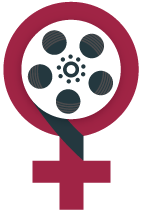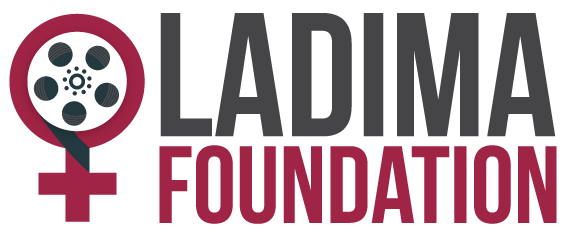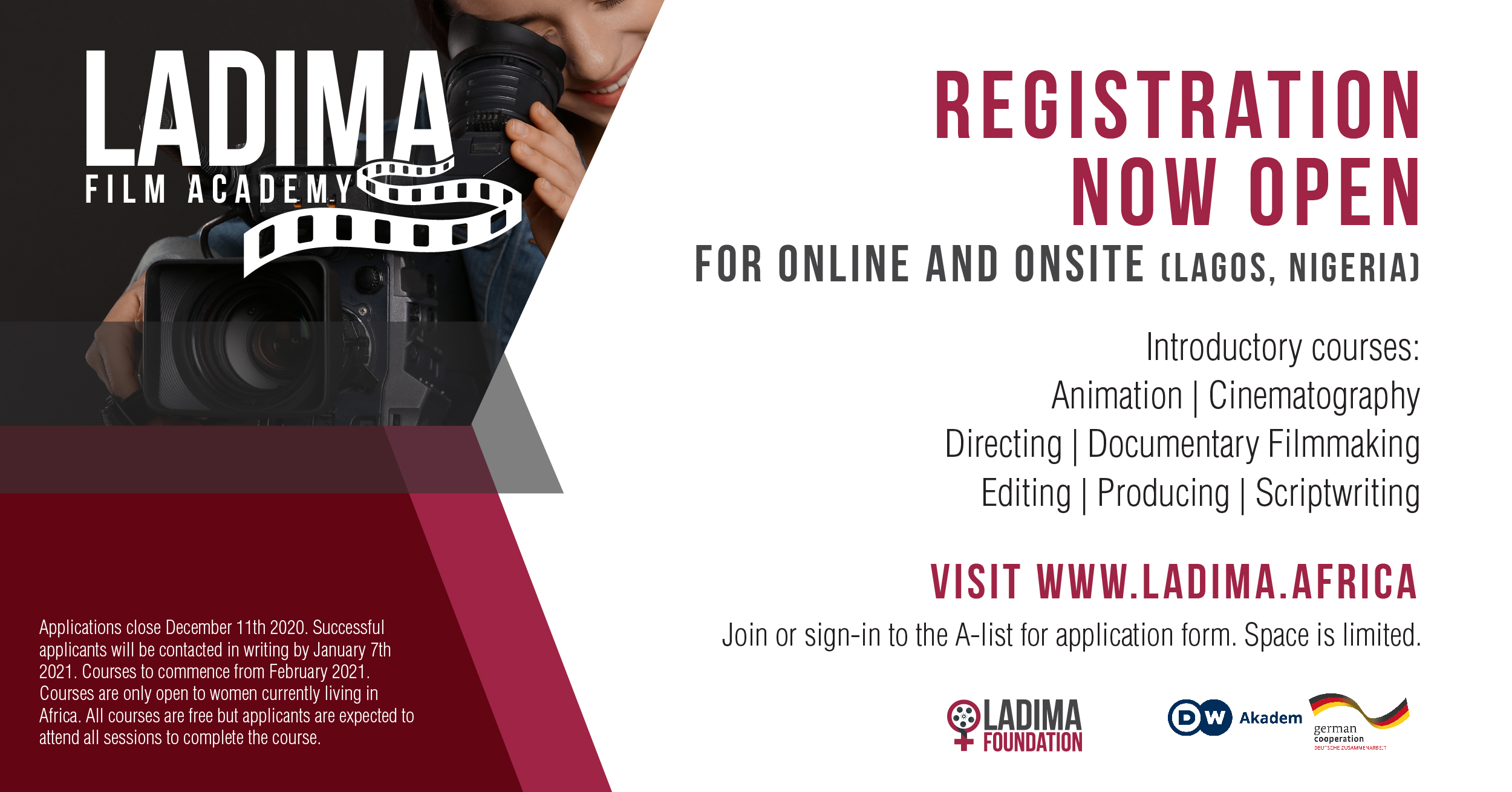LADIMA FILM ACADEMY: APPLICATIONS NOW OPEN
7 Introductory Online & On-site Courses
The Ladima Foundation, with the support of the DW Akademie, is excited to announce that applications for the Ladima Film Academy are NOW OPEN for both online and in-person introductory courses in the following disciplines:
- Documentary filmmaking
- Animation
- Editing
- Cinematography
- Producing
- Directing
- Scriptwriting
These online courses will roll out from February 2021, followed shortly thereafter in March by on-site courses which will take place in Lagos, Nigeria. All courses for this introductory phase will be FREE to those women who apply and are accepted, however, please note that women wanting to apply must be a registered member of the Ladima Foundation A-List www.ladima.africa/a-list
Online courses will be open to all aspiring and emerging professional women in film living in Africa – who are members of the A-List. Acceptance for onsite courses will be primarily focused on women living in Nigeria, and will be dependent on relevant Covid-19 protocols. Please note any and all travel, accommodation, transport, visa, or other costs related to attending the course are the attendee’s responsibility.
All courses have been developed by world-renowned industry experts with a particular focus on the African environment and also starting from a feminist perspective. The Ladima Foundation has partnered with a number of respected organisations and professionals to develop and teach these courses.
Applications are open HERE: https://ladima.africa/ladima-film-academy/
*Women will need to register for the A-List on the website in order to apply for courses.
Available Courses:
INTRODUCTION TO CINEMATOGRAPHY & VISUAL STORYTELLING
Instructor: Barry Braverman
Course Overview:
Show me a world I haven’t seen before!
In this course, students will be immersed in the art and craft of capturing visually compelling stories with their mobile phones. The aspiring cinematographer will examine how the story imperative impacts one’s creative choices in composition, lighting, focus, and point of view.
Along the way, in preparation for a final project, the emerging cinematographer will create a look book and storyboard, and because we are concerned with the total filmmaker specific to the African context, students will also explore the rudiments of proper audio recording and editing, ultimately creating a finished five-minute program for public screening at the conclusion of the course.
THE FOUNDATIONS OF FILM EDITING
Instructors: James Tayler and Kate Boswell
Course Overview
We will go back in time and study the very first film editors in order to understand the rules so that we can confidently break them. We will then get technical and look at the process of non-linear editing (NLE). You will get an overview of how a NLE edit suit works, what the most important buttons do and how to push them.
The real work of the course however will be when you roll up your sleeves and five into your own edit. You will learn by doing and do by learning. We will cover editing tips for speed and efficiency and we will introduce some of the advanced capacities of your NLE such as colour grading and sound editing. Finally you will be guided on how to deliver your finished film to various specifications
AN INTRODUCTION TO CREATIVE PRODUCING
Instructors: Cait Pansegrouw and Mehret Mandefro
Course Overview:
In this course, participants will learn about the role that the creative producer plays in filmmaking. Learners will be taken through the 5 production phases from a producer’s perspective, developing their skills in balancing the creative with the business. Producers are the engine of the film industry and while this role is seen as largely pragmatic and logistical, it also requires a holistic understanding and respect for screenwriting and filmmaking at large.
Therefore, participants will be taken through the basics of what each person’s contribution and function is in the process so that they are better equipped to lead a team and deliver a finished product. They will discover how to find material to produce, how to work with writers and directors, how to put together a finance strategy, budget and schedule, apply for funding and ultimately, launch their work into the marketplace.
THE FOUNDATIONS OF DOCUMENTARY FILMMAKING
Instructors: James Tayler and Kate Boswell
Course Overview
This course introduces the learner to the documentary production cycle and walks you through the process of selecting an idea, developing your idea into a proposal and how to go about making your film and getting it seen. We will study the fundamental types of documentary you can choose to make and consider the ethics and responsibilities of the documentary filmmaker.
This course is practical and we will learn by doing. You will come up with an original idea and be challenged to make it better. You will learn about the business aspect of documentary and be guided in the art of pitching your idea to potential investors. You will be guided through the foundation principles of film editing and as a culmination of the course present your polished idea and support material to your peers.
INTRODUCTION TO ANIMATION
Instructors: Comfort Arthur and Nick Wilson
Course Overview:
This course is intended to introduce students to basic methods and practices in animation, while also introducing them to both historical and contemporary animators work in the industry. The course will teach students the fundamental principles of animation and techniques ranging from rotoscoping, hand-drawn frame-by-frame animation, to stop motion animation. Students will learn the basic skills of 2D digital animation by developing a knowledge of Adobe Animate. Students will be given weekly assignments and quizzes to further expand their knowledge with animation techniques.
There will be an opportunity for students to work collaboratively to produce a short film and also for them to present to their class a theme of their own choosing on animation. The course will conclude with a final project in which students will develop and produce a 30-60-second animated short in a medium that they have been introduced to during the course.
WRITING THE SHORT FILM: AN INTRODUCTION TO SCREENWRITING
Instructor: Selina Ukwuoma
Course Overview:
The short film is an exciting medium that enables bold storytelling. Crucially, it is also accessible. This makes it the perfect vehicle for new filmmakers to find their voices. This workshop demystifies the writing process. You will learn how to think about storytelling for the screen — how to make it strong and impactful, whether your goal is high art or piercing social commentary — and you will be actively guided through writing your first short screenplay. In this way, you will get to grips with the principles of visual storytelling and take your first steps as a filmmaker.
THE FOUNDATIONS OF DIRECTING FILM
Instructors: James Tayler and Kate Boswell
Course Overview
This course introduces the learner to essential foundation concepts for film directing, guides you through the process of developing your own ideas and points you in the right direction on the journey to make your first film.
You will get an overview of the script writing process and gain an understanding of the basic rules of scriptwriting and how to break them. You will workshop ideas around how to approach working with actors to enable their best performances and you will also gain insight into the world and language of production design, cinematography and film editing so that you can better collaborate with other creatives. The course is practically orientated and will lead up to a class presentation where you will “pitch” your film idea and share the support material you have created over the duration of the eight weeks we spend together.
For more information about the Ladima Foundation and Film Academy please visit www.ladima.africa
About DW Akademie
DW Akademie is Deutsche Welle’s center for international media development. As a strategic partner of the Federal Ministry for Economic Cooperation and Development (BMZ), DW Akademie carries out media development projects that strengthen the human right to freedom of opinion and promote free access to information. DW Akademie also works on projects funded by the German Foreign Office and the European Union – in approximately 50 developing and emerging countries.


